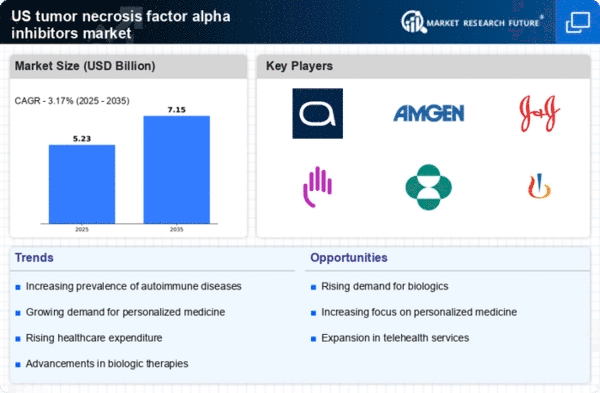Rising Healthcare Expenditure
The increasing healthcare expenditure in the US is a significant driver for the tumor necrosis-factor-alpha-inhibitors market. With healthcare spending projected to reach approximately $6 trillion by 2027, there is a growing focus on innovative therapies that can provide effective treatment for chronic conditions. This financial commitment allows for the development and accessibility of advanced biologics, including TNF-alpha inhibitors. As healthcare systems prioritize cost-effective solutions, the tumor necrosis-factor-alpha-inhibitors market is likely to benefit from increased investment in these therapies. Moreover, the willingness of patients and providers to invest in high-cost biologics reflects a shift towards prioritizing long-term health outcomes over short-term costs.
Regulatory Support for Biologics
Regulatory support for biologics in the US is a crucial driver for the tumor necrosis-factor-alpha-inhibitors market. The Food and Drug Administration (FDA) has established streamlined pathways for the approval of biologic therapies, facilitating quicker access to innovative treatments. This supportive regulatory environment encourages pharmaceutical companies to invest in the development of new TNF-alpha inhibitors, thereby expanding the market. Furthermore, the FDA's emphasis on patient-centric approaches and real-world evidence is likely to enhance the approval process for these therapies. As a result, the tumor necrosis factor alpha inhibitors market is anticipated to see an influx of new products, catering to the diverse needs of patients with autoimmune diseases..
Advancements in Clinical Research
Ongoing advancements in clinical research are significantly influencing the tumor necrosis-factor-alpha-inhibitors market. Innovative studies and trials are continuously exploring the efficacy and safety of existing and new TNF-alpha inhibitors. For instance, recent clinical trials have demonstrated improved outcomes for patients with inflammatory diseases, leading to increased adoption of these therapies. The US market is witnessing a surge in research funding, with the National Institutes of Health (NIH) allocating substantial resources to autoimmune disease research. This investment is expected to yield new treatment options and enhance the understanding of TNF-alpha inhibitors, thereby driving market growth. As a result, the tumor necrosis-factor-alpha-inhibitors market is poised for expansion, with new entrants and improved formulations likely to emerge.
Growing Awareness of Treatment Options
The growing awareness of treatment options among patients and healthcare providers is a pivotal driver for the tumor necrosis-factor-alpha-inhibitors market. Educational initiatives and patient advocacy groups are actively promoting knowledge about autoimmune diseases and available therapies. This heightened awareness encourages patients to seek medical advice and explore treatment alternatives, including TNF-alpha inhibitors. As more individuals become informed about their conditions and the potential benefits of these therapies, the demand for tumor necrosis-factor-alpha-inhibitors is expected to rise. Additionally, healthcare providers are increasingly recognizing the importance of discussing treatment options with patients, further fueling market growth.
Increasing Prevalence of Autoimmune Diseases
The rising incidence of autoimmune diseases in the US is a critical driver for the tumor necrosis-factor-alpha-inhibitors market. Conditions such as rheumatoid arthritis, Crohn's disease, and psoriasis are becoming more prevalent, with estimates suggesting that approximately 24 million individuals in the US are affected by autoimmune disorders. This growing patient population necessitates effective treatment options, thereby propelling the demand for TNF-alpha inhibitors. As healthcare providers seek to manage these chronic conditions, the tumor necrosis factor alpha inhibitors market is expected to experience substantial growth.. Furthermore, the increasing awareness and diagnosis of these diseases contribute to the market's expansion, as more patients seek therapeutic interventions to improve their quality of life.

















